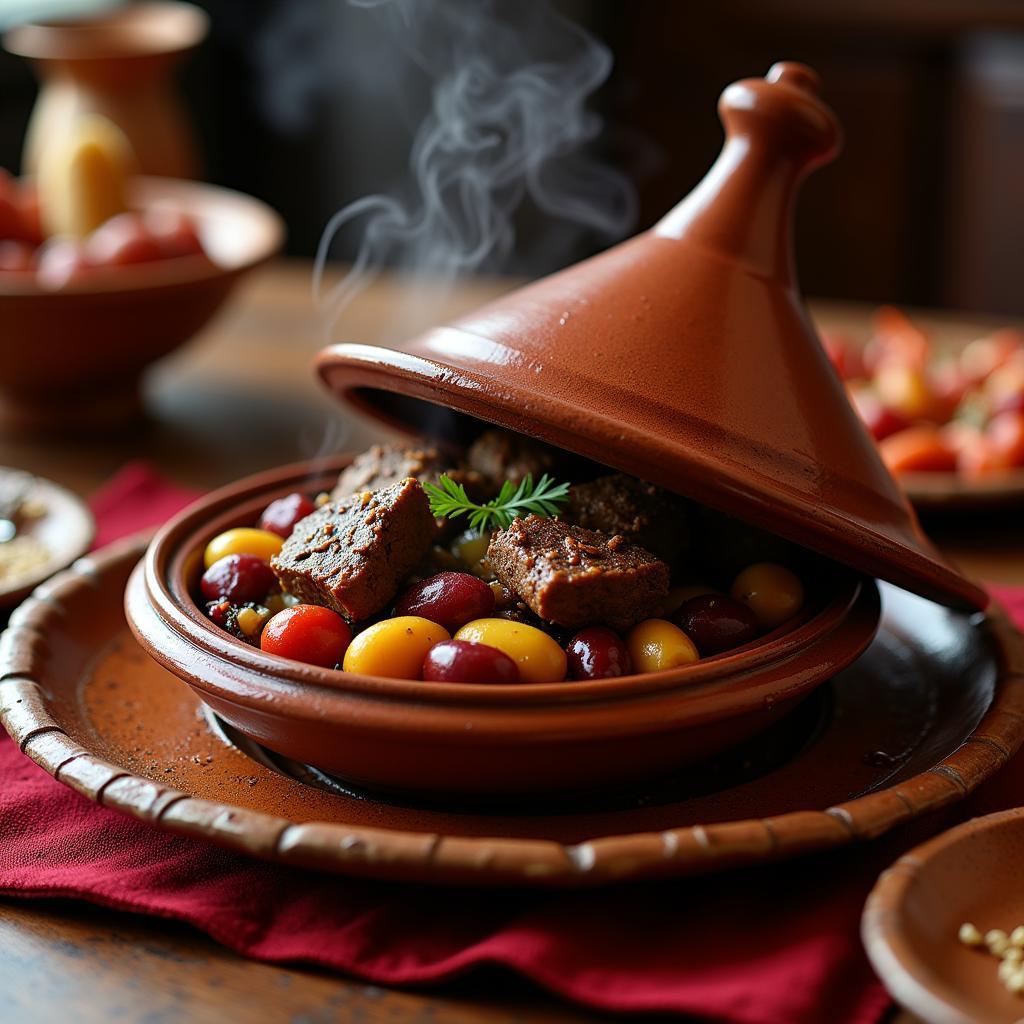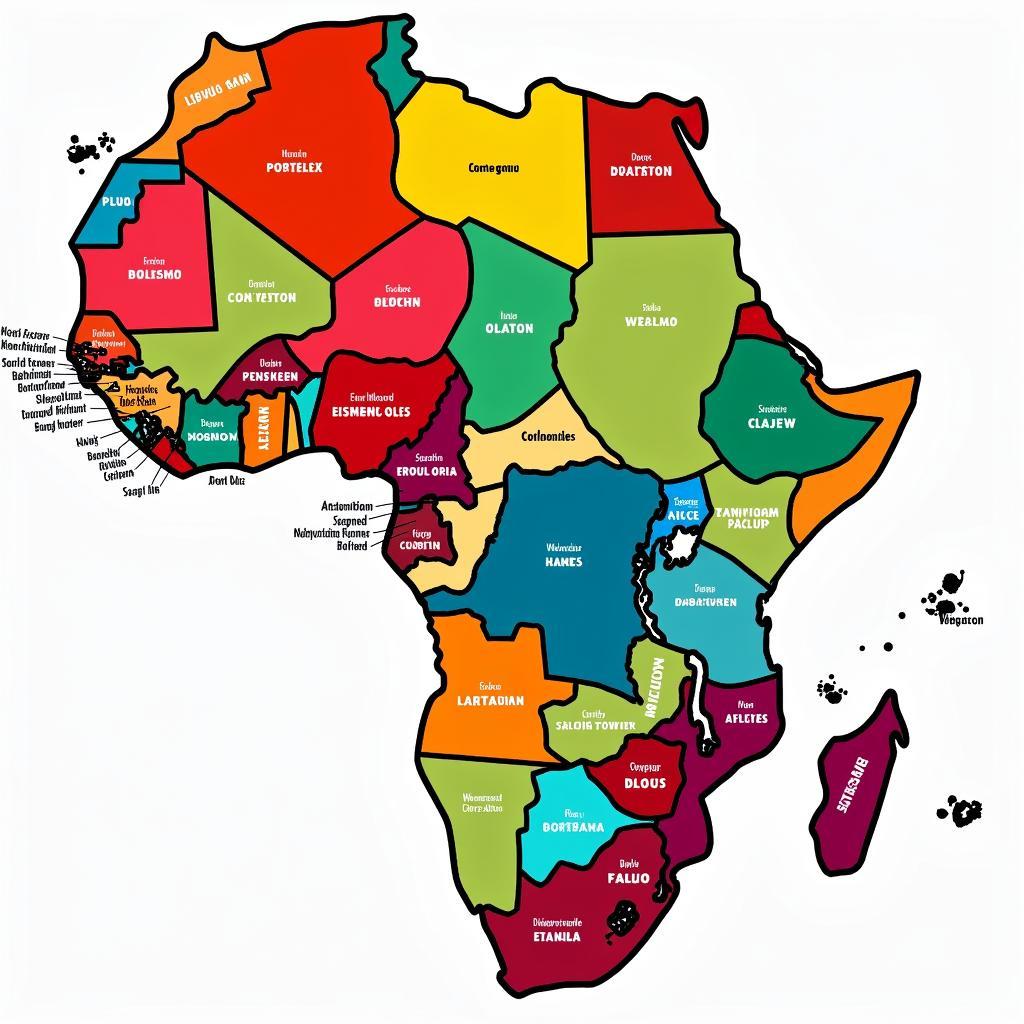Exploring African Food Items: A Culinary Journey
African Food Items represent a vibrant tapestry of flavors, ingredients, and culinary traditions, reflecting the continent’s diverse cultures and climates. From the fragrant spices of North Africa to the hearty stews of West Africa and the unique grains of East Africa, this culinary landscape offers a rich and exciting exploration for food lovers worldwide. In this article, we’ll delve into the fascinating world of African food, discovering its hidden gems and celebrating its unique characteristics.
A Diverse Culinary Landscape: Unveiling African Food Items
African cuisine isn’t a monolithic entity; it’s a mosaic of culinary traditions, each reflecting the unique environment, history, and cultural practices of its region. North African cuisine, for instance, features the aromatic influence of Berber, Arab, and Mediterranean flavors, utilizing ingredients like couscous, dates, and spices such as cumin and coriander. Moving south, West African cuisine boasts hearty stews, often featuring peanuts, okra, and palm oil, while East African cuisine incorporates influences from the Indian Ocean trade, resulting in dishes flavored with coconut milk, cloves, and cardamom. Southern Africa, with its fertile lands, is known for its abundant produce, game meats, and flavorful braais (barbecues). Understanding these regional variations is key to appreciating the diversity within African food items. For a quick overview, check out this african food items chart.
What makes African food truly special is its emphasis on fresh, locally sourced ingredients. From the grains that form the base of many meals to the fruits and vegetables that add vibrant color and flavor, African cuisine celebrates the bounty of the land.
Staple Foods: The Foundation of African Diets
Across the continent, certain staple foods form the foundation of many meals. These staples vary by region, reflecting the local agricultural landscape. In West Africa, for instance, fufu, a starchy dough made from cassava, plantains, or yams, is a common accompaniment to soups and stews. Banku, another staple, is made from fermented corn and cassava dough. In East Africa, ugali, a stiff porridge made from maize flour, is a ubiquitous dish. In North Africa, couscous, made from steamed semolina, is a staple grain, often served with tagines and other flavorful dishes.
Exploring Regional Specialties: Unique African Food Items
Beyond the staple foods, each region boasts a wealth of unique specialties. In Ethiopia, injera, a spongy flatbread made from teff flour, is used to scoop up flavorful stews and curries. In Morocco, tagine, a slow-cooked stew prepared in a distinctive conical pot, is a culinary emblem. South Africa’s bunny chow, a hollowed-out loaf of bread filled with curry, is a popular street food. These regional dishes represent just a small sample of the incredible diversity of African food items.
Do you know the African desert banana? The african desert banana is a drought-resistant fruit offering potential for food security in arid regions.
 Moroccan Tagine with Lamb and Dried Fruits
Moroccan Tagine with Lamb and Dried Fruits
Spices and Flavors: The Essence of African Cuisine
Spices play a crucial role in African cooking, adding depth and complexity to dishes. From the fragrant berbere spice blend of Ethiopia to the fiery piri-piri sauce of Mozambique, African cuisine embraces a wide range of flavors. These spices not only enhance the taste of the food but also often have medicinal properties.
Modern African Cuisine: A Fusion of Tradition and Innovation
Today, African cuisine is undergoing a renaissance, with chefs across the continent and in the diaspora innovating while honoring traditional techniques and ingredients. This new wave of African cooking is introducing the world to the rich culinary heritage of the continent, showcasing its versatility and sophistication. From fine dining restaurants to street food stalls, African food items are gaining recognition for their unique flavors and cultural significance.
If you’re interested in exotic pets, perhaps you’d like to know more about the african grey age or the african grey weaning age. These intelligent birds are fascinating companions.
Conclusion: Embracing the Richness of African Food Items
African food items offer a culinary adventure like no other. From the staple grains and flavorful stews to the unique regional specialties and aromatic spices, the cuisine of this diverse continent is a celebration of flavor, tradition, and innovation. By exploring the diverse culinary landscape of Africa, we can gain a deeper appreciation for its rich cultural heritage and the delicious bounty it has to offer. So, embark on this culinary journey and discover the fascinating world of African food items.
FAQ
- What are some common African food items? Some common African food items include fufu, ugali, injera, tagine, and bunny chow.
- What are some popular African spices? Popular African spices include berbere, piri-piri, and dukkah.
- What is the significance of food in African culture? Food plays a vital role in African culture, often associated with celebrations, rituals, and community gatherings.
- Where can I find authentic African food? Authentic African food can be found in African restaurants, specialty food stores, and through home cooking.
- What are some health benefits of African food? Many African dishes are rich in nutrients, fiber, and antioxidants, contributing to a healthy diet.
- What are some easy African recipes to try at home? There are many easy African recipes available online and in cookbooks, ranging from simple stews to flavorful rice dishes.
- How can I learn more about African cuisine? You can learn more about African cuisine through online resources, cookbooks, cooking classes, and by exploring African restaurants.
For further information, you might be interested in the african gray parrot cost.
For assistance, please contact us at: Phone: +255768904061, Email: kaka.mag@gmail.com or visit us at: Mbarali DC Mawindi, Kangaga, Tanzania. Our customer service team is available 24/7.
